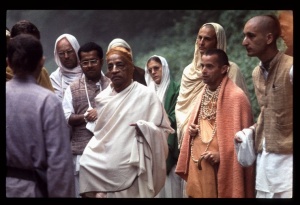SB 4.4.7: Difference between revisions
m (1 revision(s)) |
No edit summary |
||
| Line 1: | Line 1: | ||
{{info | {{info | ||
|speaker=Maitreya | |speaker=Maitreya Ṛṣi | ||
|listener=Vidura | |listener=Vidura | ||
}} | }} | ||
[[Category:Srimad-Bhagavatam - Canto 04 Chapter 04|S07]] | |||
[[Category:Bhagavatam Verses Spoken by Maitreya Rsi - Vanisource|040407]] | |||
<div style="float:left">'''[[Srimad-Bhagavatam]] - [[SB 4|Fourth Canto]] - [[SB 4.4: Sati Quits Her Body|Chapter 4: Satī Quits Her Body]]'''</div> | |||
<div style="float:right">[[File:Go-previous.png|link=SB 4.4.6]] '''[[SB 4.4.6]] - [[SB 4.4.8]]''' [[File:Go-next.png|link=SB 4.4.8]]</div> | |||
{{RandomImage}} | |||
==== TEXT 7 ==== | ==== TEXT 7 ==== | ||
<div | <div class="verse"> | ||
tām āgatāṁ tatra na kaścanādriyad | :tām āgatāṁ tatra na kaścanādriyad | ||
vimānitāṁ yajña-kṛto bhayāj janaḥ | :vimānitāṁ yajña-kṛto bhayāj janaḥ | ||
ṛte svasṟr vai jananīṁ ca sādarāḥ | :ṛte svasṟr vai jananīṁ ca sādarāḥ | ||
premāśru-kaṇṭhyaḥ pariṣasvajur mudā | :premāśru-kaṇṭhyaḥ pariṣasvajur mudā | ||
</div> | </div> | ||
| Line 16: | Line 22: | ||
==== SYNONYMS ==== | ==== SYNONYMS ==== | ||
<div | <div class="synonyms"> | ||
''tām''—her (Satī); ''āgatām''—having arrived; ''tatra''—there; ''na''—not; ''kaścana''—anyone; ''ādriyat''—received; ''vimānitām''—not receiving respect; ''yajña-kṛtaḥ''—of the performer of the sacrifice (Dakṣa); ''bhayāt''—from fear; ''janaḥ''—person; ''ṛte''—except; ''svasṟḥ''—her own sisters; ''vai''—indeed; ''jananīm''—mother; ''ca''—and; ''sa-ādarāḥ''—with respect; ''prema-aśru-kaṇṭhyaḥ''—whose throats were filled with tears of affection; ''pariṣasvajuḥ''—embraced; ''mudā''—with glad faces. | |||
</div> | </div> | ||
| Line 23: | Line 29: | ||
==== TRANSLATION ==== | ==== TRANSLATION ==== | ||
<div | <div class="translation"> | ||
When Satī, with her followers, reached the arena, because all the people assembled were afraid of Dakṣa, none of them received her well. No one welcomed her but her mother and sisters, who, with tears in their eyes and with glad faces, welcomed her and talked with her very pleasingly. | When Satī, with her followers, reached the arena, because all the people assembled were afraid of Dakṣa, none of them received her well. No one welcomed her but her mother and sisters, who, with tears in their eyes and with glad faces, welcomed her and talked with her very pleasingly. | ||
</div> | </div> | ||
| Line 30: | Line 36: | ||
==== PURPORT ==== | ==== PURPORT ==== | ||
<div | <div class="purport"> | ||
The mother and sisters of Satī could not follow the others, who did not receive Satī very well. Due to natural affection, they immediately embraced her with tears in their eyes and with loving feelings. This shows that women as a class are very softhearted; their natural affection and love cannot be checked by artificial means. Although the men present were very learned brāhmaṇas and demigods, they were afraid of their superior, Dakṣa, and because they knew that their welcoming Satī would displease him, although in their minds they wanted to receive her, they could not do so. Women are naturally softhearted, but men are sometimes very hardhearted. | The mother and sisters of Satī could not follow the others, who did not receive Satī very well. Due to natural affection, they immediately embraced her with tears in their eyes and with loving feelings. This shows that women as a class are very softhearted; their natural affection and love cannot be checked by artificial means. Although the men present were very learned ''brāhmaṇas'' and demigods, they were afraid of their superior, Dakṣa, and because they knew that their welcoming Satī would displease him, although in their minds they wanted to receive her, they could not do so. Women are naturally softhearted, but men are sometimes very hardhearted. | ||
</div> | </div> | ||
__NOTOC__ | |||
<div style="float:right; clear:both;">[[File:Go-previous.png|link=SB 4.4.6]] '''[[SB 4.4.6]] - [[SB 4.4.8]]''' [[File:Go-next.png|link=SB 4.4.8]]</div> | |||
__NOTOC__ | |||
__NOEDITSECTION__ | |||
Revision as of 17:25, 5 May 2021

A.C. Bhaktivedanta Swami Prabhupada
TEXT 7
- tām āgatāṁ tatra na kaścanādriyad
- vimānitāṁ yajña-kṛto bhayāj janaḥ
- ṛte svasṟr vai jananīṁ ca sādarāḥ
- premāśru-kaṇṭhyaḥ pariṣasvajur mudā
SYNONYMS
tām—her (Satī); āgatām—having arrived; tatra—there; na—not; kaścana—anyone; ādriyat—received; vimānitām—not receiving respect; yajña-kṛtaḥ—of the performer of the sacrifice (Dakṣa); bhayāt—from fear; janaḥ—person; ṛte—except; svasṟḥ—her own sisters; vai—indeed; jananīm—mother; ca—and; sa-ādarāḥ—with respect; prema-aśru-kaṇṭhyaḥ—whose throats were filled with tears of affection; pariṣasvajuḥ—embraced; mudā—with glad faces.
TRANSLATION
When Satī, with her followers, reached the arena, because all the people assembled were afraid of Dakṣa, none of them received her well. No one welcomed her but her mother and sisters, who, with tears in their eyes and with glad faces, welcomed her and talked with her very pleasingly.
PURPORT
The mother and sisters of Satī could not follow the others, who did not receive Satī very well. Due to natural affection, they immediately embraced her with tears in their eyes and with loving feelings. This shows that women as a class are very softhearted; their natural affection and love cannot be checked by artificial means. Although the men present were very learned brāhmaṇas and demigods, they were afraid of their superior, Dakṣa, and because they knew that their welcoming Satī would displease him, although in their minds they wanted to receive her, they could not do so. Women are naturally softhearted, but men are sometimes very hardhearted.